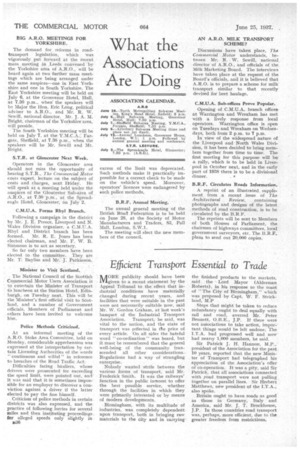Efficient Transport
Page 50

If you've noticed an error in this article please click here to report it so we can fix it.
Essential to Trade
NAORE. publicity should have been IVIgiven to a recent statement by the Appeal Tribunal to the effect that industrial conditions have materially changed during recent years, and facilities that were suitable in the past were not necessarily suitable now, said Mr. W. Gordon Graham, at last week's banquet of the Industrial Transport Association. Transport, he said, was vital to the nation, and the state of transport was reflected in the price of every article. On all sides the hateful word " co-ordination " was heard, but it must be remembered that the general well-being of the community iranscended all other considerations. Regulations had a way of strangling enterprise.
Nobody wanted strife between the various forms, of transport, said Mr. Frederick Smith. It was the railways' function in the public interest to offer the best possible service, whether through the facilities in which they were primarily interested or by means of modem developments.
Birmingham, with its multitude of industries, was completely dependent' upon transport, both in bringing raw materials to the city and in carrying'
the finished products to the markets, said the• Lord Mayor (Alderman Roberts), in his response to the toast of "The City of Birmingham," which was proposed by Capt. W.F. Strickland, M.P
Steps that might be taken to reduce redundancy ought to deal equally with rail and road, averred Mr. Peter Bennett, 0.B.E., J.P. If there were not associations to take action, important things would be left undone. The I.T.A. had progressed well and now' had nearly 1,000 members, he said.
Sir Patrick J. H. Hannon, m.p.,‘ president of the Association for the past. 10 years, reported that the new Minister of Transport had telegraphed his appreciation of the Association's offer of co-operation. It was a pity, said Sir Patrick, that all associations connected with _road transport were not pulling together on parallel lines. Sir Herbert Matthews, new president of the I.T.A., also spoke.
Britain ought to have roads as good as those in Germany, Italy and America, said Mr. J. T. Brockhouse, J.P. In those countries road transport was, perhaps, more efficient, due to the greater freedom from restrictions.




























































































